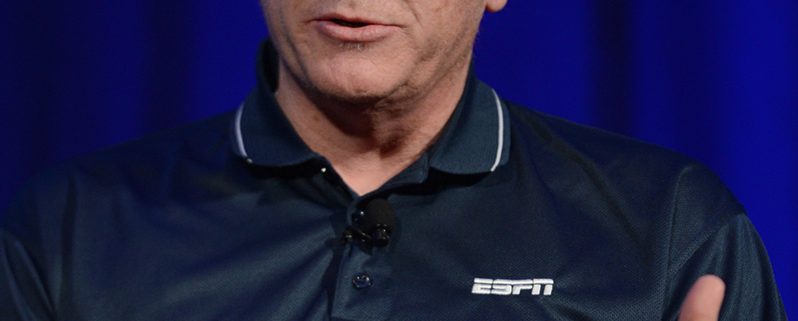Should sports mix with politics?
On Wednesday, ESPN fired baseball analyst Curt Schilling after he shared a meme on Facebook supporting a controversial North Carolina law that forces transgender people to use the bathrooms corresponding to their birth genders. On Thursday, NBA commissioner Adam Silver publicly stated he would take the 2017 All-Star Game away from Charlotte if the same law wasn’t changed.
There are people who say sports don’t matter because they are, on the surface, silly games played with balls and sticks and baskets. Those who don’t follow sports have no clue who Curt Schilling is, much less care about what he has to say.
But the truth is that sports are bigger than just games — they consist of multi-billion dollar leagues and millionaire athletes and coaches. And like any other multi-billion industry, these leagues have a sizeable footprint in society, and their star players have a voice much larger than that of the average Joe.
It’s why ESPN fired Schilling and why North Carolina should take Silver’s threat very seriously. For better or for worse, this is the impact that sports can have on society.
Schilling, an all-time great pitcher-turned-analyst, was just daring ESPN to fire him. Last year, the network suspended him for a month after sharing a Twitter post that compared Muslims to Nazis. In March, he went on a radio show and said that Hillary Clinton “should be buried under a jail somewhere.”
While Schilling crossed the line numerous times, ESPN is firing him on the grounds of his opinions — which he is certainly entitled to — rather than him not fulfilling his actual duty as a baseball analyst. An average Joe working as a truck driver would probably not be fired for doing what Schilling did, but as a public figure and television personality, it was too big of an embarrassment for ESPN.
To be clear: The North Carolina law is awful and a clear attempt to discriminate against transgender people. But Schilling has a right to engage in the debate without losing his job.
Additionally, I think such a law should be changed for a different reason than the NBA threatening to pull the All-Star Game. The NBA is absolutely doing the right thing by taking a stance on a controversial issue. But in turn, if North Carolina changes the law, it will be because its politicians don’t want to lose out on the millions of dollars that holding an All-Star Game would bring into the state, not because they genuinely believe the law is wrong.
It’s happened before. Just last month, Georgia governor Nathan Deal vetoed an anti-gay rights bill after the NFL warned that the passing of the law could cost Atlanta a Super Bowl in the future. Former Arizona Gov. Jan Brewer vetoed a similar bill two years ago based on a similar threat — the NFL threatening to pull the Super Bowl in 2015 from Phoenix. Last year, while the Final Four was being held in Indianapolis, Indiana immediately issued amendments to another religious liberty bill after NCAA President Mark Emmert spoke out against it. In the 1990s, the NFL also almost single-handedly forced Arizona to celebrate Martin Luther King Jr. Day by actually rescinding a Super Bowl from the state. Not until the voters approved the holiday did the league bring the game back to Arizona in 1996.
Losing out on All-Star Games, Super Bowls or Final Fours should not be the main catalysts for social change. Sure, the results should be applauded, but the reasons behind them are based more on money than morality — and I’m afraid what’s happening in North Carolina is heading toward the same path.
Ultimately, all of this shows that the power of sports stretches well off the playing field and into politics, and that creates ambiguity. Schilling has shown no indication that he is anything but a bigoted moron, but should his political opinions be held against him by his now ex-employer? The North Carolina law should be repealed, but does it sit right that it might only happen because a basketball game won’t be played there?
I guess we’ll have to take what we can get. Obviously, it would be ideal if governors stopped signing discriminatory laws and former athletes refrained from supporting them, but until that day comes, we are — at least partially — reliant on sports figures such as ESPN and NBA commissioners to police society, for better or for worse.
Eric He is a freshman majoring in print and digital journalism. He is also the sports editor of the Daily Trojan. His column, “Grinding Gears,” runs Fridays.


A highly public figure (athlete, politician, actor, etc.) who misbehaves or makes obnoxious statements to the media reflects badly on his employer – a TV network, a sports team, a political party, a movie being made – and that person knows the penalties. They are clearly spelled out in their contract – fine, suspension, or dismissal.
Simple rule: Think whatever you like, but don’t damage yourself by blurting it out. Insult, disparage, threaten or upset people and there are social and maybe financial and career penalties to be paid. For a public figure who has signed a contract spelling this out, the stupidity of doing it is even worse.